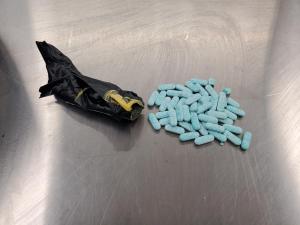CINCINNATI – In July, U.S. Customs and Border Protection (CBP) at the Port of Cincinnati participated in Operation Artemis, part of the Department of Homeland Security’s (DHS) analytics and intelligence-based enforcement efforts to disrupt the fentanyl supply chain. As part of the national response to the opioid crisis, DHS has launched multiple special operations over the course of 2023 to target drug trafficking organizations and the illicit flow of fentanyl.
“The Port of Cincinnati knows the challenges our country faces when protecting our citizens from the dangers of fentanyl and other illicit drugs,” said Chief Supervisory CBP Officer Eric Zizelman. “Our officers are committed to this challenge, and consistently use training and technology to find these dangerous drugs and work with our law enforcement counterparts to take action against criminal enterprises.”
Since January 1, 2023, CBP officers in Cincinnati have seized 60 shipments containing 22 pill press machines and 257 pill press components such as die sets, adapters, and stamps. Additionally, officers seized three shipments of fentanyl and two shipments of xylazine. The xylazine shipments originated in India.
Used by veterinarians as a sedative for large animals, xylazine is being increasingly found mixed with opioids like fentanyl and heroin, often with deadly results. Both the Food and Drug Administration (FDA) and the Drug Enforcement Administration (DEA) have issued warnings about xylazine, also known as “tranq.” In addition to the inherent danger of overdose, this chemical is not a narcotic and does not respond to Narcan. There is no known antidote.
This year, Cincinnati CBP officers found fentanyl within the insulated panels on an oven, tucked within the heating element of an electric coffeemaker, and inside bags of nutritional supplements. The fentanyl came from Mexico and Dominican Republic. Most of the pill presses and components found by Cincinnati officers were imported from China, with some coming from Canada, Dominican Republic, India, and Taiwan. The shipments were destined to states across the U.S. and countries around the globe.
“The work our officers and specialists do on a daily basis provides the backbone of our national defense against these deadly substances,” said LaFonda D. Sutton-Burke, Director of Chicago Field Operations. “Whether it is stopping a shipment of fentanyl at the frontlines, or working with our local, federal, or international partners to dismantle transnational criminal organizations, CBP will continue to do our part in addressing this serious challenge facing our country.”
On October 3, the Department of Justice announced eight indictments charging China-based companies and their employees with crimes relating to fentanyl and methamphetamine production, distribution of synthetic opioids, and sales resulting from precursor chemicals. CBP and other law enforcement agencies initiated the cases which led to these indictments, another example of the importance of interagency cooperation and shared intelligence, especially in high-risk environments.
In four months of operation, CBP’s Operation Artemis led to over 900 seizures, including over 13,000 pounds of fentanyl precursor chemicals, over 2,590 pounds of non-fentanyl precursor chemicals,142 pill presses and 325 pill molds, more than 270 pounds of fentanyl pills and powder, and more than 210 pounds of Xylazine, more than 1,160 pounds of methamphetamine, and over 11,230 pounds of other finished synthetic drugs. Additionally, last week CBP released an updated, comprehensive strategy to continue to fight fentanyl and synthetic drugs that have killed hundreds of thousands of Americans and impacted countless lives, families, and communities.
CBP conducts operations at ports of entry and export throughout the United States, and regularly screens inbound and outbound international passengers and cargo for narcotics, weapons, and other restricted or prohibited products. CBP strives to serve as the premier law enforcement agency enhancing the nation’s safety, security, and prosperity through collaboration, innovation, and integration.



